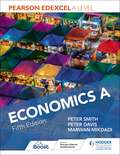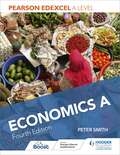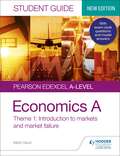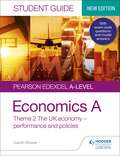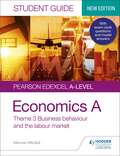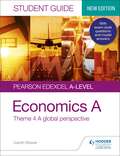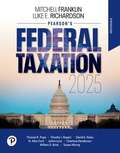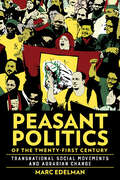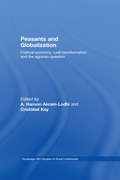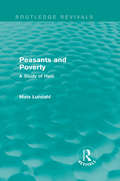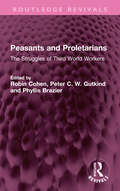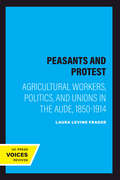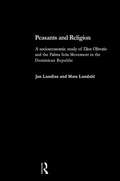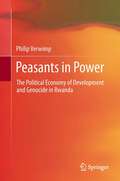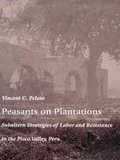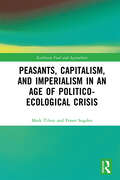- Table View
- List View
Pearson Edexcel A level Business
by Ian Marcouse Nigel Watson Andrew HammondIan Marcousé's accessible and engaging textbooks brought together in one updated volume covering everything your students need to know for the Pearson Edexcel A level Business specification.- Breaks content down into short, clear chapters - covering all topics in the depth students need- Updated business examples throughout the text and in end of unit case studies bring the subject to life- A range of questions and activities provide students with the opportunity to apply what they know and practise questions- Builds students' confidence with key terms used in context and compiled in an accessible glossary - Supported by an Answer Guide to assist teaching and save time This Student Book has been endorsed for use with the Pearson Edexcel A Level Business qualification.
Pearson Edexcel A level Business
by Ian Marcouse Nigel Watson Andrew HammondIan Marcousé's accessible and engaging textbooks brought together in one updated volume covering everything your students need to know for the Pearson Edexcel A level Business specification.- Breaks content down into short, clear chapters - covering all topics in the depth students need- Updated business examples throughout the text and in end of unit case studies bring the subject to life- A range of questions and activities provide students with the opportunity to apply what they know and practise questions- Builds students' confidence with key terms used in context and compiled in an accessible glossary - Supported by an Answer Guide to assist teaching and save time This Student Book has been endorsed for use with the Pearson Edexcel A Level Business qualification.
Pearson Edexcel A level Economics A Fifth Edition
by Peter Smith Peter Davis Marwan Mikdadi- Revised synoptic links to aid thinking across A-level topics- Knowledge-check questions to test students' understanding and grow their confidence- Refreshed real-world case studies on up-to-date topics with follow-up questions to build knowledge- New practice questions to develop important assessment skills, with answers available online- New examples, statistics and information in context
Pearson Edexcel A level Economics A Fifth Edition
by Peter Smith Peter Davis Marwan Mikdadi- Revised synoptic links to aid thinking across A-level topics- Knowledge-check questions to test students' understanding and grow their confidence- Refreshed real-world case studies on up-to-date topics with follow-up questions to build knowledge- New practice questions to develop important assessment skills, with answers available online- New examples, statistics and information in context
Pearson Edexcel A level Economics A Fourth Edition
by Peter SmithThis updated all-in-one textbook for Pearson Edexcel A level Economics A combines revised topic-by-topic guidance with brand new material. This book:- provides full coverage of all topics on the Edexcel A level Economics A specification- builds confidence and essential quantitative skills with knowledge check questions and exercises throughout the book, and answers available online- helps you understand and explain key economic concepts and issues accurately and effectively with clearly defined key terms throughout the text and in the theme-by-theme glossaries- keeps you up to date: new exciting case studies with follow-up questions linked to key specification topics will help you analyse and evaluate important economic trends and developments- develops important skills through new practice questions coupled with extracts and figures, and answers available online
Pearson Edexcel A-level Economics A Student Guide: Theme 1 Introduction to markets and market failure
by Mark GavinThis new edition Student Guide has been fully updated for 2019 and covers Theme 1 Introduction to markets and market failure A-level Paper 1 Markets and business behaviour, and A-level Paper 3 Microeconomics and Macroeconomics will both draw on topics from Theme 1.With clear topic summaries of content needed for the exams, knowledge-check questions and samples of exam-style questions and answers throughout, this guide will help you prepare for exams with confidence.-Identify key content for the exams with our concise summary of topics-Find out what examiners are looking for with our Questions and Answers section-Test their knowledge with rapid-fire questions and answers-Avoid common pitfalls with clear definitions and exam tips throughout-Reinforce learning with bullet-list summaries at the end of each section
Pearson Edexcel A-level Economics A Student Guide: Theme 1 Introduction to markets and market failure
by Mark GavinThis new edition Student Guide has been fully updated for 2019 and covers Theme 1 Introduction to markets and market failure A-level Paper 1 Markets and business behaviour, and A-level Paper 3 Microeconomics and Macroeconomics will both draw on topics from Theme 1.With clear topic summaries of content needed for the exams, knowledge-check questions and samples of exam-style questions and answers throughout, this guide will help you prepare for exams with confidence.-Identify key content for the exams with our concise summary of topics-Find out what examiners are looking for with our Questions and Answers section-Test their knowledge with rapid-fire questions and answers-Avoid common pitfalls with clear definitions and exam tips throughout-Reinforce learning with bullet-list summaries at the end of each section
Pearson Edexcel A-level Economics A Student Guide: Theme 2 The UK economy – performance and policies
by Quintin BrewerThis new edition Student Guide has been fully updated for 2019 and covers Theme 2 The UK economy - performance and policies A-level Paper 2 The national and global economy, and A-level Paper 3 Microeconomics and Macroeconomics will both draw on topics from Theme 2.With clear topic summaries of content needed for the exams, knowledge-check questions and samples of exam-style questions and answers throughout, this guide will help you prepare for exams with confidence.- Identify key content for the exams with our concise summary of topics- Find out what examiners are looking for with our Questions and Answers section- Test your knowledge with rapid-fire questions and answers- Avoid common pitfalls with clear definitions and exam tips throughout- Reinforce learning with bullet-list summaries at the end of each section
Pearson Edexcel A-level Economics A Student Guide: Theme 3 Business behaviour and the labour market
by Marwan MikdadiThis new edition Student Guide has been fully updated for 2019 and covers Theme 3 Business behaviour and the labour market, A-level Paper 1 Markets and business behaviour, and A-level Paper 3 Microeconomics and Macroeconomics will both draw on topics from Theme 3.With clear topic summaries of content needed for the exams, knowledge-check questions and samples of exam-style questions and answers throughout, this guide will help you prepare for exams with confidence.- Identify key content for the exams with our concise summary of topics- Find out what examiners are looking for with our Questions and Answers section- Test your knowledge with rapid-fire questions and answers- Avoid common pitfalls with clear definitions and exam tips throughout- Reinforce learning with bullet-list summaries at the end of each section
Pearson Edexcel A-level Economics A Student Guide: Theme 3 Business behaviour and the labour market
by Marwan MikdadiThis new edition Student Guide has been fully updated for 2019 and covers Theme 3 Business behaviour and the labour market, A-level Paper 1 Markets and business behaviour, and A-level Paper 3 Microeconomics and Macroeconomics will both draw on topics from Theme 3.With clear topic summaries of content needed for the exams, knowledge-check questions and samples of exam-style questions and answers throughout, this guide will help you prepare for exams with confidence.- Identify key content for the exams with our concise summary of topics- Find out what examiners are looking for with our Questions and Answers section- Test your knowledge with rapid-fire questions and answers- Avoid common pitfalls with clear definitions and exam tips throughout- Reinforce learning with bullet-list summaries at the end of each section
Pearson Edexcel A-level Economics A Student Guide: Theme 4 A global perspective
by Quintin BrewerThis new edition Student Guide has been fully updated for 2019 and covers Theme 4 A global perspective, A-level Paper 2 The national and global economy, and A-level Paper 3 Microeconomics and Macroeconomics will both draw on topics from Theme 4.With clear topic summaries of content needed for the exams, knowledge-check questions and samples of exam-style questions and answers throughout, this guide will help you prepare for exams with confidence.- Identify key content for the exams with our concise summary of topics- Find out what examiners are looking for with our Questions and Answers section- Test your knowledge with rapid-fire questions and answers- Avoid common pitfalls with clear definitions and exam tips throughout- Reinforce learning with bullet-list summaries at the end of each section
Pearson Edexcel A-level Economics A Student Guide: Theme 4 A global perspective
by Quintin BrewerThis new edition Student Guide has been fully updated for 2019 and covers Theme 4 A global perspective, A-level Paper 2 The national and global economy, and A-level Paper 3 Microeconomics and Macroeconomics will both draw on topics from Theme 4.With clear topic summaries of content needed for the exams, knowledge-check questions and samples of exam-style questions and answers throughout, this guide will help you prepare for exams with confidence.- Identify key content for the exams with our concise summary of topics- Find out what examiners are looking for with our Questions and Answers section- Test your knowledge with rapid-fire questions and answers- Avoid common pitfalls with clear definitions and exam tips throughout- Reinforce learning with bullet-list summaries at the end of each section
Pearson Edexcel GCSE (9–1) Business, Third Edition
by Ian MarcouseWith up-to-date case studies of real-world businesses, this fully updated Edexcel GCSE (9-1) Business Student Textbook will help your students respond to exam questions with confidence, demonstrating how they can structure their answers for maximum impact. This Student Textbook includes:- Fully up-to-date exam questions, with 25% more practice questions- Real-world case studies, new and updated, to reflect the developments in e-commerce and the impact of recent global and political developments- Quick knowledge-recall questions throughout the book to help students check understanding, and for teachers to use in assessment
Pearson Edexcel GCSE (9–1) Business, Third Edition
by Ian MarcouseWith up-to-date case studies of real-world businesses, this fully updated Edexcel GCSE (9-1) Business Student Textbook will help your students respond to exam questions with confidence, demonstrating how they can structure their answers for maximum impact. This Student Textbook includes:- Fully up-to-date exam questions, with 25% more practice questions- Real-world case studies, new and updated, to reflect the developments in e-commerce and the impact of recent global and political developments- Quick knowledge-recall questions throughout the book to help students check understanding, and for teachers to use in assessment
Pearson's Federal Taxation 2025 Individuals
by Mitchell Franklin Luke E. RichardsonPearson’s Federal Taxation 2025 Individuals, of the hallmark Franklin and Richardson series, clearly explains the principles of taxation and the latest tax regulations. It covers all entities, with often briefer treatment than the Corporations and Comprehensive volumes. This long-trusted resource blends technical aspects of tax law with maximum readability and relevance. Hands-on practice problems will help you apply tax principles to practical accounting practices. The 38th Edition incorporates tax information from 2023 and early 2024. The new edition is a complete refresh reflecting the latest tax rulings and regulations, as well as their implications for tax law. It features an abundance of new real-world examples and significant court cases demonstrating the current tax law at work.
Pearson: Efficacy 2.0
by James Weber Elie Ofek Marco Bertini Oded KoenigsbergPearson, that billed itself as the "world's learning company", faced a host of critical decisions in mid-2020. Several years prior, it had embarked on a new path that put the learner at the heart of the business and committed to a new strategic orientation. The new approach, under the heading of "efficacy", was meant to ensure that products and services were developed with measurable outcomes that mattered to learners in mind; and such offerings would further be taken to market with an emphasis on touting their efficacy credentials. While several efficacy reports had been produced on existing products to hone the framework, 2020 marked the first year Pearson launched a new product (the AIDA Calculus app) with efficacy in mind from the get go. As CEO John Fallon, the main architect behind efficacy, neared the end of his tenure at Pearson, he wanted to chart the next phase of the efficacy journey. In particular, should the company develop all its products and services with efficacy as the guiding principle? Which learner outcomes made the most sense to focus on in the future? How could Pearson better communicate efficacy in the marketplace and get it to resonate with various stakeholders - particularly educators and learners? With competitors following suit and using efficacy in their own communications, often without the same rigor that Pearson had applied, how should Pearson combat such "copy-cat" behavior? Was efficacy a pillar upon which to build the Pearson brand? In short, should he and his successor bet the "Pearson farm" on efficacy?
Peasant Politics of the Twenty-First Century: Transnational Social Movements and Agrarian Change (Cornell Series on Land: New Perspectives on Territory, Development, and Environment)
by Marc EdelmanPeasant Politics of the Twenty-First Century illuminates the transnational agrarian movements that are remaking rural society and the world's food and agriculture systems. Marc Edelman explains how peasant movements are staking their claims from farmers' fields to massive protests around the world, shaping heated debates over peasants' rights and the very category of "peasant" within the agrarian organizations and in the United Nations.Edelman chronicles the rise of these movements, their objectives, and their alliances with environmental, human rights, women's, and food justice groups. The book scrutinizes high-profile activists and the forgotten genealogies and policy implications of foundational analytical frameworks like "moral economy," and concepts, such as "food sovereignty" and "civil society." Peasant Politics of the Twenty-First Century charts the struggle of agrarian movements in the face of land grabbing, counter agrarian reform, and a looming climate catastrophe, and celebrates engaged research from Central America to the UN Human Rights Council in Geneva.
Peasants and Globalization: Political Economy, Agrarian Transformation and Development (Routledge Iss Studies In Rural Livelihoods Ser. #2)
by A. Haroon Akram-Lodhi Cristóbal KayIn 2007, for the first time in human history, a majority of the world’s population lived in cities. However, on a global scale, poverty overwhelmingly retains a rural face. This book assembles an unparalleled group of internationally-eminent scholars in the field of rural development and social change in order to explore historical and contemporary processes of agrarian change and transformation and their consequent impact upon the livelihoods, poverty and well-being of those who live in the countryside. The book provides a critical analysis of the extent to which rural development trajectories have in the past and are now promoting a change in rural production processes, the accumulation of rural resources, and shifts in rural politics, and the implications of such trajectories for peasant livelihoods and rural workers in an era of globalization. Peasants and Globalization thus explores continuity and change in the debate on the ‘agrarian question’, from its early formulation in the late 19th century to the continuing relevance it has in our times, including chapters from Terence Byres, Amiya Bagchi, Ellen Wood, Farshad Araghi, Henry Bernstein, Saturnino M Borras, Ray Kiely, Michael Watts and Philip McMichael. Collectively, the contributors argue that neoliberal social and economic policies have, in deepening the market imperative governing the contemporary world food system, not only failed to tackle to underlying causes of rural poverty but have indeed deepened the agrarian crisis currently confronting the livelihoods of peasant farmers and rural workers. This crisis does not go unchallenged, as rural social movements have emerged, for the first time, on a transnational scale. Confronting development policies that are unable to reduce, let alone eliminate, rural poverty, transnational rural social movements are attempting to construct a more just future for the world’s farmers and rural workers.
Peasants and Poverty: A Study of Haiti (Routledge Revivals)
by Mats LundahlHaiti is a country which, until the earthquake of 2010, remained largely outside the focus of world interest and outside the important international historical currents during its existence as a free nation. The nineteenth century was the decisive period in Haitian history, serving to shape the class structure, the political tradition and the economic system. During most of this period, Haiti had little contact with both its immediate neighbours and the industrialised nations of the world, which led to the development of Haiti as a peasant nation. This title, first published in 1979, examines the factors responsible for the poverty of the Haitian peasant, by using both traditional economic models as well as a multidisciplinary approach incorporating economics and other branches of social science. The analysis deals primarily with the Haitian peasant economy from the early 1950s to the early 1970s, examining in depth the explanations for the secular tendency of rural per capita incomes to decline during this period.
Peasants and Proletarians: The Struggles of Third World Workers (Routledge Revivals)
by Robin Cohen Phyllis Brazier Peter C.W. GutkindOriginally published in 1979, this book examines differing forms of international, interracial working- class action and the relationship between workers’ struggles in the periphery and those in advanced capitalist countries. It analyses the nature of class alliances forged in the countryside and the urban sprawls of the developing world among workers, students and the unemployed. The volume draws on theoretical debates and detailed empirical studies dealing with a wide range of countries in Asia, Latin America, Africa and the Caribbean. Each of the sections is preceded by a linking editorial comment and the editors also provide an introductory overview.
Peasants and Protest: Agricultural Workers, Politics, and Unions in the Aude, 1850-1914
by Laura Levine FraderIn the first decade of the twentieth century, the sleepy vineyard towns of the Aude department of southern France exploded with strikes and protests. Agricultural workers joined labor unions, the Socialist party established a base among peasant vinegrowers, and the largest peasant uprising of twentieth-century France, the great vinegrowers' revolt of 1907, shook the entire south with massive demonstrations. In this study, Laura Levine Frader explains how left-wing politics and labor radicalism in the Aude emerged from the economic and social transformation of rural society between 1850 and 1914. She describes the formation of an agricultural wage-earning class, and discusses how socialism and a revolutionary syndicalist labor movement together forged working-class identity.Frader's focus on the making of the rural proletariat takes the study of class formation out of the towns and cities and into the countryside. Frader emphasizes the complexity of social structure and political life in the Aude, describing the interaction of productive relations, the gender division of labor, community solidarities, and class alliances. Her analysis raises questions about the applicability of an urban, industrial model of class formation to rural society. This study will be of interest to French social historians, agricultural historians, and those interested in the relationship between capitalism, class formation, and labor militancy.
Peasants and Religion: A Socioeconomic Study of Dios Olivorio and the Palma Sola Religion in the Dominican Republic (Routledge Studies in Development and Society)
by Mats Lundahl Jan LundiusThis book examines the relationship between economics, politics and religion through the case of Olivorio Mateo and the religious movement he inspired from 1908 in the Dominican Republic. The authors explore how and why the new religion was formed, and why it was so successful. Comparing this case with other peasant movements, they show ways in which folk religion serves as a response to particular problems which arise in peasant societies during times of stress.
Peasants in Power: The Political Economy of Development and Genocide in Rwanda
by Philip VerwimpThis book shows how Rwanda's development model and the organisation of genocide are two sides of the same coin. In the absence of mineral resources, the elite organised and managed the labour of peasant producers as efficient as possible. In order to stay in power and benefit from it, the presidential clan chose a development model that would not change the political status quo. When the latter was threatened, the elite invoked the preservation of group welfare of the Hutu, called for Hutu unity and solidarity and relied on the great mass (rubanda nyamwinshi) for the execution of the genocide. A strategy as simple as it is horrific. The genocide can be regarded as the ultimate act of self-preservation through annihilation under the veil of self-defense. Why did tens of thousands of ordinary people massacred tens of thousands other ordinary people in Rwanda in 1994? What has agricultural policy and rural ideology to do with it? What was the role of the Akazu, the presidential clan around president Habyarimana? Did the civil war cause the genocide? And what insights can a political economy perspective offer ? Based on more than ten years of research, and engaging with competing and complementary arguments of authors such as Peter Uvin, Alison Des Forges, Scott Strauss, René Lemarchand, Filip Reyntjens, Mahmood Mamdani and André Guichaoua, the author blends economics, politics and agrarian studies to provide a new way of understanding the nexus between development and genocide in Rwanda. Students and practitioners of development as well as everyone interested in the causes of violent conflict and genocide in Africa and around the world will find this book compelling to read. .
Peasants on Plantations: Subaltern Strategies of Labor and Resistance in the Pisco Valley, Peru
by Vincent PelosoAfter the 1854 abolition of slavery in Peru, a new generation of plantation owners turned to a system of peasant tenantry to maintain cotton production through the use of cheap labor. In Peasants on Plantations Vincent C. Peloso analyzes the changing social and economic relationships governing the production of cotton in the Pisco Valley, a little-studied area of Peru's south coast. Challenging widely held assumptions about the system of relations that tied peasants to the land, Peloso's work examines the interdependence of the planters, managers, and peasants--and the various strategies used by peasants in their struggle to resist control by the owners.Grounded in the theoretical perspectives of subaltern studies and drawing on an extremely complete archive of landed estates that includes detailed regular reports by plantation managers on all aspects of farming life, Peasants on Plantations reveals the intricate ways peasants, managers, and owners manipulated each other to benefit their own interests. As Peloso demonstrates, rather than a simple case of domination of the peasants by the owners, both parties realized that negotiation was the key to successful growth, often with the result that peasants cooperated with plantation growth strategies in order to participate in a market economy. Long-term contracts gave tenants and sharecroppers many opportunities to make farming choices, to assert claims on the land, compete among themselves, and participate in plantation expansion. At the same time, owners strove to keep the peasants in debt and well aware of who maintained ultimate control.Peasants on Plantations offers a largely untold view of the monumental struggle between planters and peasants that was fundamental in shaping the agrarian history of Peru. It will interest those engaged in Latin American studies, anthropology, and peasant and agrarian studies.
Peasants, Capitalism, and Imperialism in an Age of Politico-Ecological Crisis (Earthscan Food and Agriculture)
by Mark Tilzey Fraser SugdenThis book utilises a new theoretical approach to understand the dynamics of the peasantry, and peasant resistance, in relation to capitalism, state, class, and imperialism in the global South. In this companion volume to Peasants, Capitalism, and the Work of Eric R. Wolf, the authors further develop their thinking on agrarian transitions to capitalism, the development of imperialism, and the place of the peasantry in these dynamics, with special reference to the global South in an era of politico-ecological crisis. Focusing on the political role of the peasantry in contested transitions to capitalism and to modes of production outside of, and beyond, capitalism, the book contends that an understanding of these dynamics requires an analysis of class struggle and of the resources, material and discursive, that different classes can bring to bear on this struggle. The book focuses on the rise of capitalism in the global South within the context of imperial subordination to the global North, and the place of the peasantry in shaping and resisting these dynamics. The book presents case studies of contested transitions to agrarian capitalism in Bolivia, Ecuador, Guatemala, Mexico, Peru, and South Asia. It also examines the case of transition to a post-capitalist mode of production in Cuba. The book concludes with an assessment of the nature of capitalism and imperialism within the context of the contemporary politico-ecological crisis, and the potential role of the peasantry as agent of emancipatory change towards social and environmental sustainability. This book will be of great interest to students and researchers in the areas of peasant studies, rural politics, agrarian studies, development, and political ecology.

